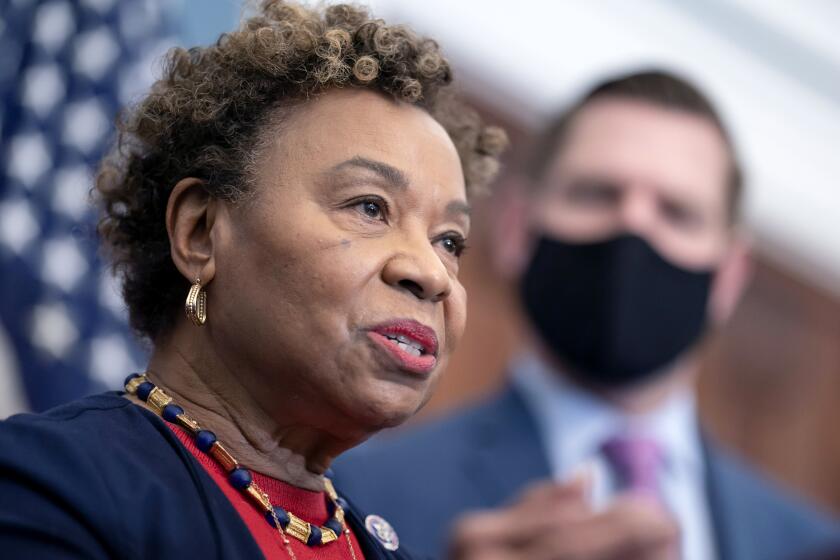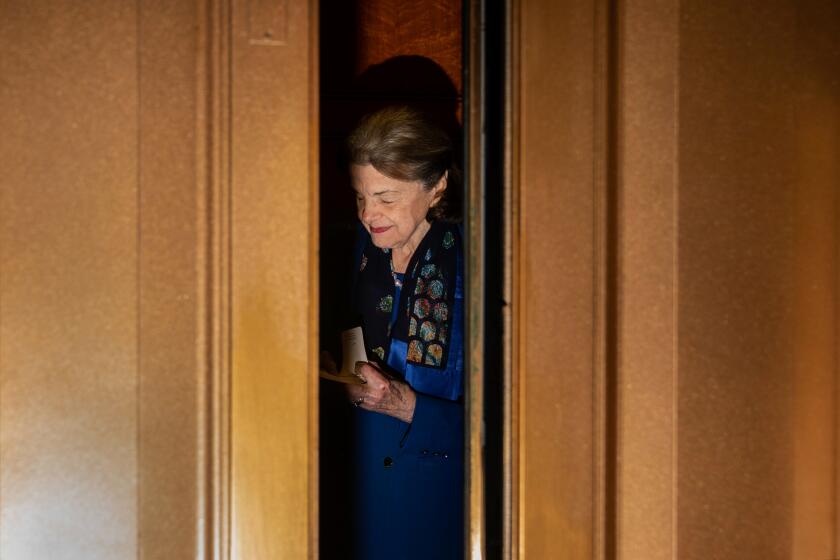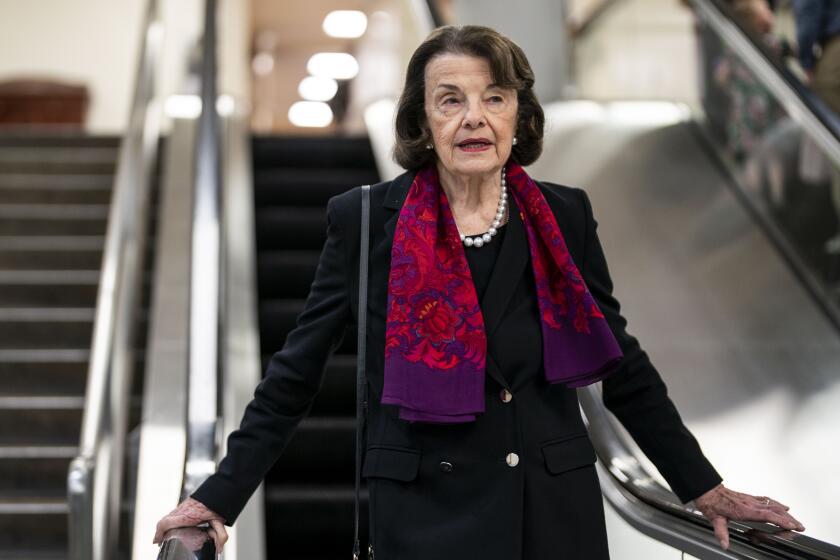Democrats hoped Feinstein would return next week. She’s made no promises
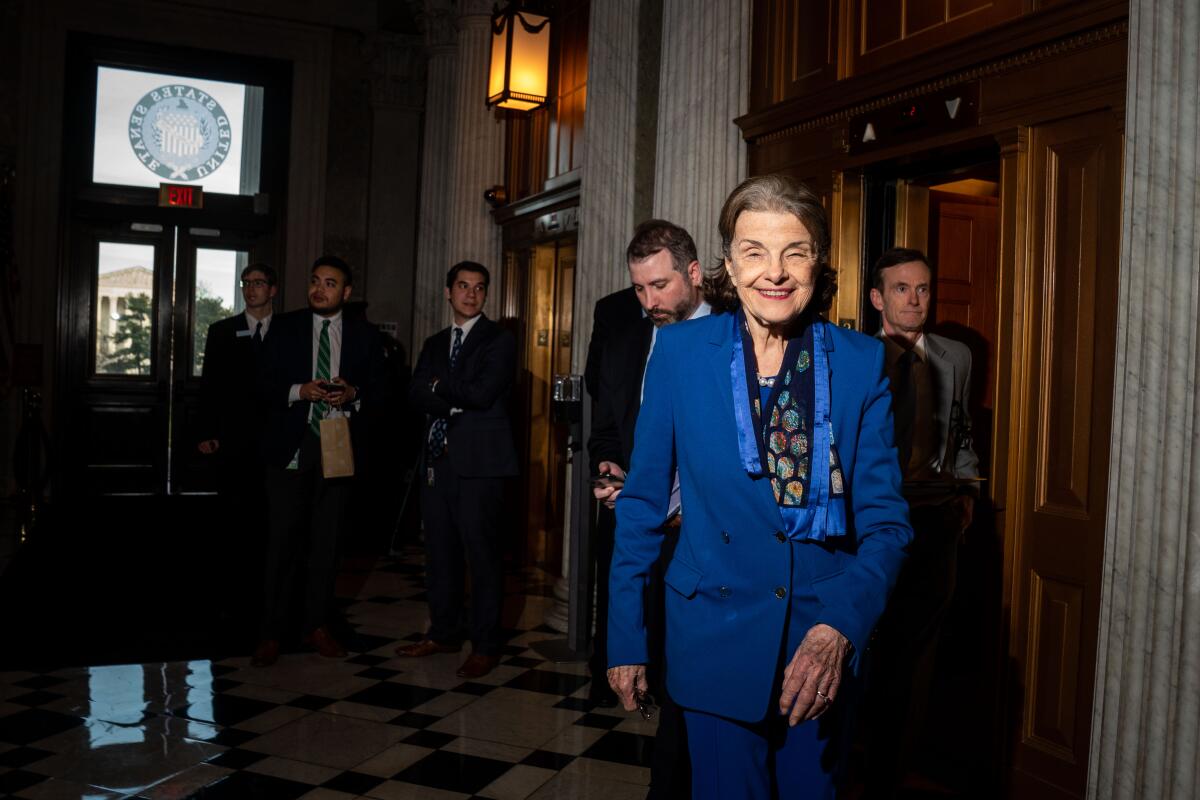
- Share via
WASHINGTON — A handful of activists from the progressive group Indivisible hopped on Zoom this week to directly pose questions to Sen. Dianne Feinstein’s staff that are swirling in the U.S. Capitol and California political circles.
Will the Democratic senator, who was diagnosed with shingles in late February and has not been back to Washington since, return to the Senate, they asked, according to a participant on the call. If so, when? Is there a process to determine her timetable, or a plan if she cannot return?
The answers — or lack thereof — left them unsatisfied.
“They were lovely people, but they changed the subject,” said Patti Crane, who is a member of the Indivisible South Bay L.A. chapter and attended the meeting. “They didn’t answer our questions.”
For years, Feinstein has swatted down growing concerns about her health, assuring constituents largely through statements to the media that she is still able to serve. But with her prolonged absence from the Capitol this spring, pressure is building on the 89-year-old senator and her staff to provide additional details about her condition.
With Democrats holding a bare-bones majority in the Senate, they need Feinstein’s vote to confirm judges, approve Biden Cabinet nominees and potentially avert a debt ceiling default. Senators must be at the Capitol to vote, and are not allowed to do so remotely. The predicament has put into stark relief the challenge of balancing a lawmaker’s privacy against the public’s right to know about the health of their representatives.
There should be “the highest degree of transparency of the senator’s medical condition,” said Norm Eisen, an ethics official in the Obama White House who now works at the Brookings Institution, in written comments. That accounting, he said, must involve a “full medical briefing on her condition and on its prognosis; the best and honest judgment whether she’ll be able to return, and if so, when; and for how long she’ll be able to work everyday.”
Sen. Dianne Feinstein’s weeks-long absence from Washington has refocused attention on Gov. Gavin Newsom’s promise to appoint a Black woman if a U.S. Senate seat opens up.
“Frankly, it is inexplicable to me that a long-standing public servant and leader like Sen. Feinstein would compromise the public interest in this way” by withholding that critical information, Eisen said.
Feinstein spokesman Adam Russell said the senator “has been transparent that her absence from Washington is due to a shingles diagnosis” and related complications. After a brief hospitalization in February, Feinstein has been recuperating at home in San Francisco.
Last month, Feinstein requested a Democratic member temporarily replace her on the Senate Judiciary Committee to allay concerns about a backlog of judge confirmations, but Republicans blocked that effort.
“Like any serious medical condition, shingles does not follow a straight line from diagnosis to recovery,” Russell said. “She has been unable to provide an exact timeline for her return to Washington because that is contingent upon her doctor’s advising her that it’s safe for her to travel.”
On Thursday, Feinstein released a statement in response to the criticism that she is impeding the confirmation of judges, pointing out that the Judiciary Committee has approved most of those who have come forward during her absence.
“I’m disappointed that Republicans on the committee are blocking a few from moving forward,” Feinstein said. “I’m confident that when I return to the Senate, we will be able to move the remaining qualified nominees out of committee quickly and to the Senate floor for a vote.”
Feinstein’s office declined to provide a briefing or written report from her doctor to The Times.
Such an independent assessment is crucial in cases of long-term health challenges, said former Sen. Barbara Boxer, the California Democrat who served in the Senate with Feinstein for more than 20 years.
“Should there be transparency? I say yes. I think it’s better for the people who voted for you, who put their trust in you,” Boxer said.
Health has traditionally been a taboo topic in the Senate, where deference to seniority remains strong. When late Sen. Strom Thurmond, a Republican from South Carolina, continued to serve until his late 90s, questions of his fitness and mobility were mostly muted. Colleagues of nonagenarian Sen. Robert C. Byrd of West Virginia similarly tread lightly in speaking about his ailments — including a six-week hospitalization for a staph infection — even as his deteriorating condition was apparent as he was wheeled onto the Senate floor to cast decisive votes to pass the Affordable Care Act in 2009.
Lawmakers from both parties suggested the more open speculation about Feinstein’s health was motivated by a sexist double standard.
“I’ve never seen them go after a man who was sick in the Senate in that way,” former House Speaker Nancy Pelosi, Feinstein’s fellow San Francisco Democrat, told reporters last week.
But others say the scrutiny is a natural byproduct of a slimly divided Senate.
A case of shingles can mean two weeks of burning agony for a younger patient. But in older people like Sen. Feinstein, it’s far more likely to last longer.
When Sen. Thad Cochran, a Republican from Mississippi, was sidelined for prolonged periods in 2017 and 2018 due to a urinary tract infection and other maladies, his absence made it difficult for his party to cut taxes, a top legislative priority. The issue was compounded with Sen. John McCain of Arizona being away from the Senate for cancer treatment — leaving Republicans without two crucial votes.
“Having two senators sick with such a narrow majority in the Senate, it drew a lot more attention than had we had a little more cushion,” said Brad Smith, Cochran’s former chief of staff.
The opacity around Feinstein’s condition also stands in contrast with information released by Sen. John Fetterman’s office when he was hospitalized this year for depression. The Pennsylvania Democrat, who had been criticized during his campaign last year for not fully disclosing at first the severity of a stroke he suffered on the eve of the primary, was heralded for his uncommon transparency around mental health issues. His staff also released pictures of the senator during his hospitalization at Walter Reed National Military Medical Center in Bethesda, Md.
In Washington, specific clues about Feinstein’s status has been unearthed in unconventional ways. Senate Majority Leader Charles E. Schumer (D-N.Y.) did not answer questions about Feinstein during a news conference Tuesday, but prepared notes he carried to the lectern that were captured in a Politico photo indicated that he had spoken with her recently and expected her to return in the coming days.
“I spoke with Sen. Feinstein yesterday. We are both hopeful she can return next week,” read the notes.
A Schumer spokesman confirmed to The Times that what was in the notes was accurate.
Feinstein’s spokesperson said that the two senators spoke on Sunday but that there was still no timeline for her return to the Senate.
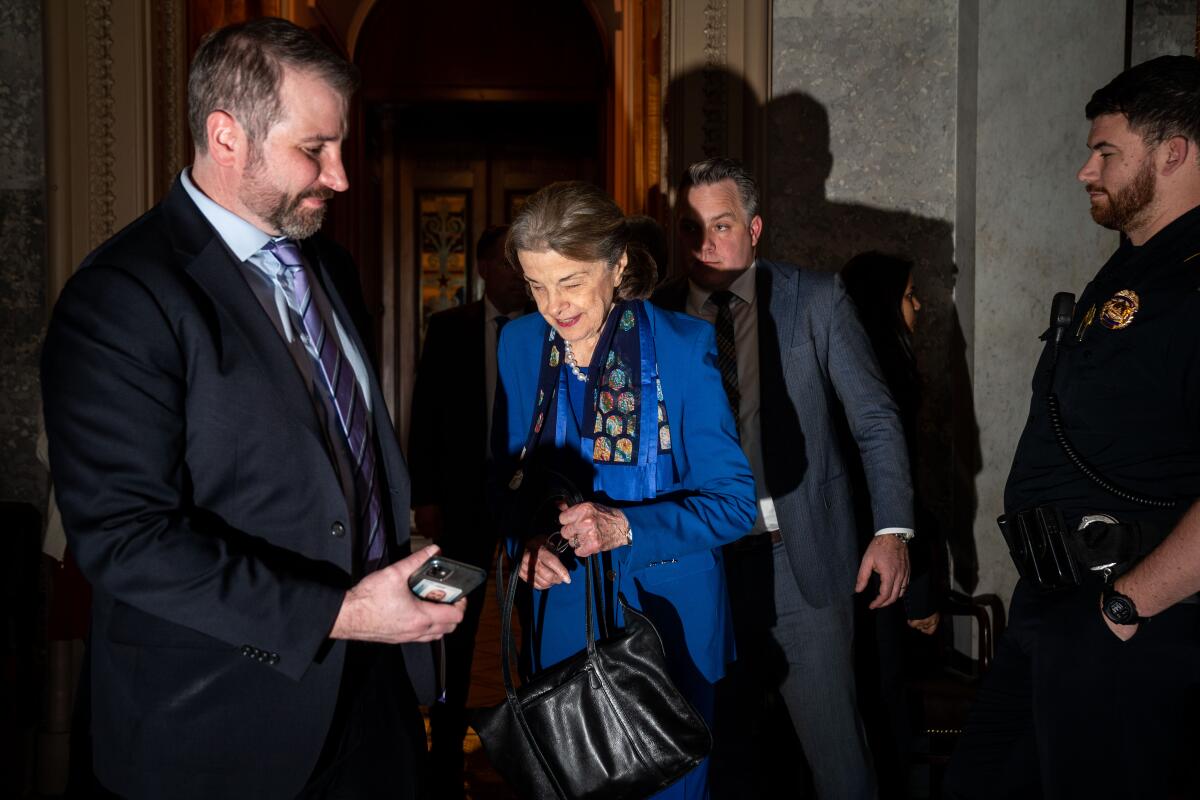
Most senators who spoke with The Times said they hadn’t spoken with Feinstein directly in recent weeks and were getting their information from Schumer.
“I’ve heard she’s recovering and I heard she’s gonna be back soon. So I’m very excited to see her,” said Sen. Kirsten Gillibrand (D-N.Y.).
Sen. Alex Padilla (D-Calif.), who serves on the Judiciary Committee with Feinstein and began his political career as a member of her staff, said he exchanged messages with her late last week but hadn’t connected directly.
He said that he knew Feinstein was “frustrated that the recovery hasn’t happened more quickly.”
“She’s eager to get back, I know that,” he said.
In California, the state’s top Democrats, including those running to succeedFeinstein in the Senate, were largely circumspect about whether she was sufficiently keeping her constituents informed.
Rep. Barbara Lee of Oakland, a Senate contender, “believes that Sen. Feinstein’s health should be everyone’s primary concern and that she and her family deserve privacy,” said her campaign spokeswoman, Katie Merrill. She declined to detail any contact Lee has had with the senator.
A spokesperson for Rep. Adam B. Schiff of Burbank, another Senate candidate, said his staff “has been in touch with the senator’s staff, but we don’t have anything to share about those conversations at this time — it is up to the senator or her staff to share relevant information with constituents.”
Campaign officials for Rep. Katie Porter of Irvine, another Democrat vying for the Senate seat, did not respond to questions about transparency; neither did a spokesman for Gov. Gavin Newsom.
Despite the lack of details, Feinstein’s health is frequently a topic of speculation at California political events, said Los Angeles County Democratic Party Chair Mark Gonzalez. “People are concerned — for her health and also our majority in the Senate,” he said.
Those concerns prompted Indivisible California, the progressive group that has often clashed with Feinstein, to release an open letter last month calling on the senator to resign. The letter, signed by 64 local chapters that represent more than 100,000 members, spurred the 40-minute Zoom meeting on Wednesday with Feinstein’s state director, Peter Muller; her Northern California director, Joanne Hayes-White; and her field representative, Sam Yankovich.
Addressing the roadblock the longtime Democratic senator from California’s absence has created for judicial nominations, the administration says, “It is her decision.”
During the meeting, Crane and others asked about Schumer’s suggestion that Feinstein could be back as soon as next week.
“Sen. Schumer may have more information than I do, but we have not provided any guidance to suggest that she will be back next week, other than she wants to be back,” Muller said, according to Crane’s recollections and notes from the meeting.
Muller acknowledged the difficulty of the moment while also saying that some of the reporting about Feinstein’s absence has been misleading by exaggerating the impact it has had on Senate Democrats’ ability to act on judicial confirmations. Last week, the Senate confirmed seven circuit court judges who had bipartisan support.
Crane said that during the Zoom meeting they were told Feinstein’s primary care physician is meeting with her at least once a week. They were also told that Hayes-White, who previously was the chief of the San Francisco Fire Department, has been visiting with her regularly.
“One of the challenges is, it is a long trip to make that five-hour flight. The No. 1 priority is to recover well enough to make the trip,” Hayes-White told the representatives of Indivisible, according to Crane.
The demand for more information may be especially hard for Feinstein, her allies acknowledge, given that more discretion had been afforded to senators in the past.
“It’s very hard for those of us who grew up in a world that had much more privacy,” Boxer said. “But this is a unique circumstance because of the situation in the U.S. Senate that is so perilously and closely divided.”
Times staff writers Mason and Oreskes reported from Los Angeles. Special correspondent Joseph reported from Washington.
More to Read
Get our L.A. Times Politics newsletter
The latest news, analysis and insights from our politics team.
You may occasionally receive promotional content from the Los Angeles Times.
